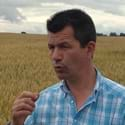Christophe Guerton took over the running of his parents' farm in Autruy-Sur-Juine in north-central France in 1993 and has since grown it to 195 hectares.
The main rotation over the chalky clay soils are two varieties of winter wheat – Courtot and Galibier – which are particularly suitable for milling, as well as barley and oil seed rape, with peas and carrots also grown for seed.
The farm is a member of a local cooperative, which brings benefits in terms of technical advice and cost savings when buying products such as fertilizer. Grain is also marketed by the cooperative, which helps to achieve a higher price than if farmers sold on an individual basis.
Key areas of sustainable practice
The farm is a member of the Arvalis Charter farm assurance scheme, which requires it to comply with specific standards relating to the environment, production methods and food safety.
The farm is also part of the agriculture raisonnée scheme that advocates an integrated approach to farm management and promotes positive environmental practices that don’t jeopardize the economics of the farm.
The farm undertakes soil testing for nitrogen at the beginning of spring so that it can accurately calculate forthcoming application rates. Later in the season, crop stem samples are tested to calculate plant nitrogen levels, and the results used to determine final application requirements. This helps to ensure protein levels in the grain are suitable for milling.
The farm has made the most of its geographic position and soils to produce a high-quality, in-demand milling wheat for which it receives a premium price.
Cooling stored grain with ventilation fans helps to eliminate the need for pest control treatment and reduces the risks of mold.
A purpose-built facility stores all of the farm’s plant protection products. This locked, bunded and heated facility ensures that no stored chemicals can leak into the natural environment.
Both the sprayer and fertilizer spreader are regularly calibrated to ensure that products are applied both effectively and accurately.
Learn more about Christophe Guerton’s story
Explore the case study, where you’ll find extra details on how the farm has performed against the program’s good practice standards and criteria, what external research reveals about the producer's actions and how improved sustainability benefits them.
“The challenge for modern-day farming is working in a way which benefits both the environment and the economics of the farming business. The work and practices being implemented on this farm show that this can be achieved while still being able to produce a quality product which is very much in demand.
Being part of the Natura 2000 network and agriculture raisonnée has not been detrimental to the business but has been used as an opportunity to improve working practices, reduce input costs and increase returns.
Not all farms have the soil type or climatic conditions to be able to grow milling wheats, but this is as much about using the available resources and producing a product that the market wants and is willing to pay a premium for. The farm has a focus and direction which will steer it long into the future.”



